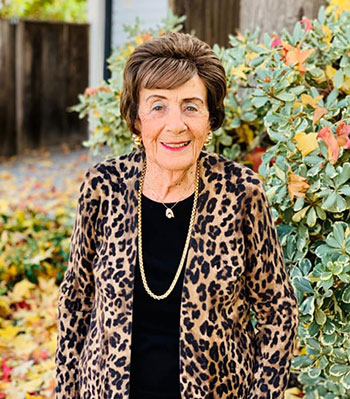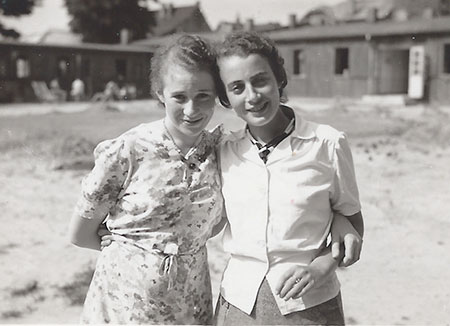Being Jewish
Personality
Fanny Krasner Lebovits’s Story of Survival, Courage and Love

“Hate remains an issue even today,” observed Fanny Krasner Lebovits, a 95-year-old Holocaust survivor, nurse and longtime Hadassah activist in San Diego. “The senseless murder of our fellow Hadassah member, Lori Kaye, of blessed memory, in the Chabad of Poway attack merely because she was Jewish torments me. Our response to this atrocity—despite our rage—must be love, outreach and education.”
That life-affirming message underscores every page of Lebovits’s new memoir, Memories, Miracles & Meaning: Insights of a Holocaust Survivor, co-written with Selwyn Isakow and Sid Shapira. The book traces her extraordinary life as the eldest of three sisters from Liepāja, Latvia—known in German as Libau.
Born Feiga-Chasse Judelowitz in 1922, Lebovits was 19 when Nazis invaded her town. She survived the Libau ghetto and five concentration and work camps, where, as a nurse, she was often assigned to care for the sick.
Rather than descend into darkness, Lebovits recounts the horror of her Holocaust-era experiences by remembering the humanity and courage of those around her, most especially her beloved mother, Sara. Lebovits describes the moment when she and her sister Jenny—who also survived—were separated from their mother and youngest sister at the Kaiserwald concentration camp:
It was extremely cold in the yard, and the children continued to cry. Eventually, the women were sorted into two groups. Those who were able to work were directed to stand in one line, while the smaller children with their mothers, the elderly and the sick were ordered to the other line.
My baby sister, Liebele, who was just 8 years old, was sent to the other line. The other line was reserved for those not useful to the SS and would probably result in certain death.
My mother, who was in our line, took my hand and Jenny’s hand and asked me to take care of Jenny. Despite our desperate crying and begging, my mother, following her maternal instincts, left our line and joined the other line with her youngest child. She could not leave her 8-year-old daughter to die alone….
It was one of the most brave and most courageous acts I have ever witnessed…. There isn’t a day that I don’t think about my mother’s selfless act.
It is believed that Sara and Liebele Judelowitz were murdered immediately on reaching Auschwitz on November 2 or 3, 1943.

After liberation, Lebovits found a nursing job with the United Nations Relief and Rehabilitation Administration and later worked for the World Jewish Congress in Sweden. Eventually, she left Europe for South Africa, where she married her second husband, Louis Krasner, with whom she had three children. (At 18, she had married Monya Kaganski in one of many “ghetto weddings” held in Libau in 1941. Kaganski died from typhus in May 1945.) In 1979, after their grown children had moved to the United States, the Krasners settled in San Diego. Tragically, not long after immigrating, Louis Krasner suffered a fatal heart attack.
It was after the loss of her second husband that she began “Finding Purpose Through Hadassah,” a title given to a chapter in the memoir. Over the ensuing decades, Lebovits—who in 1982 married Morrie Lebovits—rose to become the president of the Pacific Southwest Region. She has won a host of Hadassah awards and, on each of her 35 trips to Israel, has visited Hadassah Hospital.
“Each Hadassah project,” she writes in the book, “is an expression of the fulfillment of the Zionist dream and Zionist reality. In 1948, we fought for the establishment of the State of Israel. Today, we have to fight for continued existence and safety.”
Lebovits frequently speaks with school groups about her Holocaust experience. With this memoir, she said she hopes to further “educate young people about this atrocity and to ensure that it never happens again.”









 Facebook
Facebook Instagram
Instagram Twitter
Twitter
Lynn Breger says
Fanny approaches mizvot like exercise – she practices kindness daily – a warm smile, encouraging word and ever a helping measure!